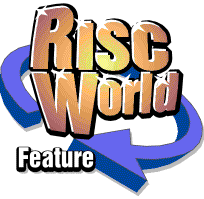



USB Standards
Dave Bradforth takes a look at USB via RISC OS
USB Standards
If you're looking to use USB devices on a RISC OS computer, you have a choice of two cards. The first, available from Castle Technology Ltd, costs £89 whereas the other (which seems to have attracted a lot of support) is available from Stuart Tyrell Developments at £79. (You now also have a choice of a UniPod from STD at £99 - ED)
The heading for this article, USB Standards, was originally chosen to reflect how RISC OS users could benefit from the use of standard PC components and how life in general was getting a little easier for those of us trying to get better performance out of our slowly aging technology. Unfortunately, when I asked for comments from users who have experience of USB through RISC OS the results were less than positive.
One developer commented that it was difficult to get the necessary technical information out of Simtec; the manufacturers of the STD card; but that they were considering releasing a driver for a USB graphics tablet that had taken a while to write. "Keyboards work well", he commented in response to my request for a screenshot of USB via RISC OS.
Another user commented that both the Castle and STD USB cards did not implement a full USB stack � namely the lack of an isynchronous transfer mode � which means that no audio or video device is likely to work; a fact that is not mentioned in any of the publicity material for either card.
It was therefore with interest that I noticed the announcement from Stuart Tyrell Developments of MassFS.
It begins "Support for RISC OS users is central to the ethos of the Simtec/STD USB implementation - we have considered it important to produce a solution which offers assistance to those who require it, without encouraging an exodus to resellers who do not support RISC OS machines which might be seen with a "generic" implementation. MassFS V1.00 continues our model of enabling support to be offered within the RISC OS customer-base, yet encourage users to experiment with new devices."
Which immediately gives us a very positive start. It basically explains that Stuart Tyrell and his team are looking to drive the creation of generic drivers for USB devices under RISC OS.
It continues "Much of our work in the USB arena has been to characterise the USB Mass Storage protocol and the differing implementations of this by device developers. It is this work which has seen the release of support for large Zip drives, MP3 players and other devices, and has resulted in the acceptance of the Simtec/STD card as something which simply "works". Our extensions to MassFS allow many of these differing implementations to be used successfully."
Which would immediately seem to answer the query asked by my second correspondent. So how is Mass FS going to be implemented for users of the Simtec/STD card?
"The new MassFS implementation is this: People who purchase USB devices from Stuart Tyrrell Developments will receive a fully supported version of MassFS, as before. These versions will present a "support key" for each device which may be used in order to obtain support direct from Stuart Tyrrell Developments. Users without MassFS who wish to use products solely sourced within the RISC OS arena may purchase MassFS for £10 inc".
Which sounds fair enough � after all, the creation of these drivers is likely to take a long time; and it's not time that's free. Stuart Tyrell works on a number of projects for a number of clients at the same time; and as such this is time that may be better spent in a more profitable arena.
"In addition to this, MassFS V1.00 allows further mass-storage type devices to be added to a "other devices" file, and the user may experiment with a number of different settings available which cover many different device implementations. Devices added in this manner with the correct settings are fully functional, however these devices appear with a different icon and will not yield a "support key".
"The first user to supply verifiable settings for each new device back to STD (which do not already exist in the "other devices" file) will receive a version of MassFS for that device free of charge (worth £10). These settings will be incorporated into the "other devices" file, which is freely downloadable and available to all users. "
So if you provide settings for your USB devices to STD, and they can verify them, a fully working driver should in theory be supplied. Note this seems to only apply to devices that can be treated as a hard drive � so MP3 players, external hard discs, and such like. This is all a positive step in the right direction; and as for owners of the Castle USB card it's probable that at some point that the developments Castle are making for the Iyonix PC will make their way onto the USB implementation for Risc PC series computers.
Next time, we'll take the hardware column into overdrive for a detailed look at MassFS, and how well it works.
Dave Bradforth